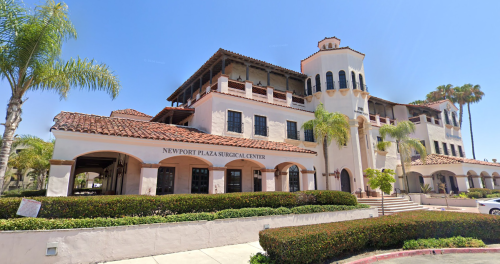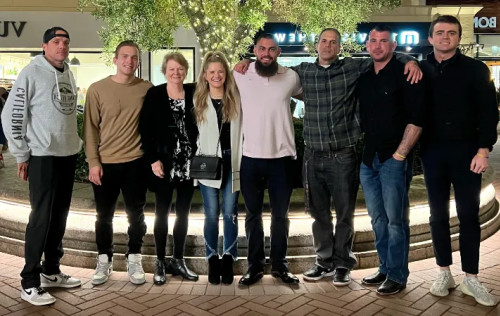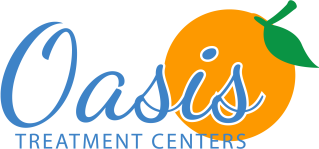






Oasis Treatment Centers
Treatment Focus
This center treats substance use disorders and co-occurring mental health conditions. Your treatment plan addresses each condition at once with personalized, compassionate care for comprehensive healing.
Primary Level of Care
Outpatient treatment offers flexible therapeutic and medical care without the need to stay overnight in a hospital or inpatient facility. Some centers offer intensive outpatient program (IOP), which falls between inpatient care and traditional outpatient service.
Claimed
Recovery.com has connected directly with this treatment provider to validate the information in their profile.
Treatment Focus
This center treats substance use disorders and co-occurring mental health conditions. Your treatment plan addresses each condition at once with personalized, compassionate care for comprehensive healing.
Primary Level of Care
Outpatient treatment offers flexible therapeutic and medical care without the need to stay overnight in a hospital or inpatient facility. Some centers offer intensive outpatient program (IOP), which falls between inpatient care and traditional outpatient service.
Provider's Policy
Oasis Treatment Centers works with most health insurance providers to help make substance use treatment available.
Oasis Treatment Centers
Oasis Treatment Centers
About Oasis Treatment Centers
Oasis Treatment Centers offers outpatient, and sober living care in sunny Costa Mesa for individuals struggling with a range of behavioral health challenges, including any substance use disorders, depression, anxiety, trauma, and other co-occurring mental health conditions.
Oasis welcomes adults for treatment, regardless of whether they live in California. They host 12 clients at a time.
Therapies
Oasis uses evidence-based therapies, such as cognitive-behavioral therapy (CBT), dialectical behavior therapy (DBT), and mindfulness practices, with medication-assisted treatment and awareness of the interaction of the mind, body, and spirit. They use eye movement desensitization and reprocessing to help individuals heal from traumatic events. Their treatment addresses primary and co-occurring conditions at the same time to provide whole-person care.
Oasis' treatment of marijuana addiction sets them apart from most other treatment centers.
The focus of Oasis' therapy is group therapy, but clients also meet weekly 1-on-1 with a counselor.
Therapy Times
Oasis Treatment Centers operates 24/7 and can admit clients day or night. They often do admit clients late at night.
Their day, intensive outpatient program (IOP), standard outpatient therapy, and sober living can last 3 months to a year, depending on the client's needs.
Day treatment lasts 6 to 8 hours each day.
The IOP program can meet during the day or from 6 to 9 p.m., based on which times is better for the clients. It meets 9 to 12 hours a week.
Their sober living options serve clients who completed residential or outpatient care. Clients receive a house with 5 housemates. Oasis transports clients from the sober living houses to their center for group therapy meetings.
Therapy Team
The expert team of clinicians and counselors develop customized treatment plans that empower patients with practical tools for long-term recovery. Their leadership team includes case managers, a licensed marriage and family therapist, an associate marriage and family therapist, and a speech-language pathologist. A specialty of this team is treating clients with post-traumatic stress disorder (PTSD). Oasis employs a 2:1 client to clinical team ratio.
After Therapy
Clients can meet onsite for continuing support in their recovery, and Oasis serves them a free lunch.
Center Overview
Treatment Focus
This center treats substance use disorders and co-occurring mental health conditions. Your treatment plan addresses each condition at once with personalized, compassionate care for comprehensive healing.
Joint Commission Accredited
The Joint Commission accreditation is a voluntary, objective process that evaluates and accredits healthcare organizations (like treatment centers) based on performance standards designed to improve quality and safety for patients. To be accredited means the treatment center has been found to meet the Commission's standards for quality and safety in patient care.
Insurance Accepted
Cash Pay Rates
Estimated Cash Pay Rate
Center pricing can vary based on program and length of stay. Contact the center for more information. Recovery.com strives for price transparency so you can make an informed decision.
Levels of Care








Your Care Options
Specializations
Chronic Relapse
Consistent relapse occurs repeatedly, after partial recovery from addiction. This condition requires long-term treatment.
Codependency
Codependency is a pattern of emotional dependence and controlling behavior. It's most common among people with addicted loved ones.
Drug Addiction
Drug addiction is the excessive and repetitive use of substances, despite harmful consequences to a person's life, health, and relationships.
Post Traumatic Stress Disorder
PTSD is a long-term mental health issue caused by a disturbing event or events. Symptoms include anxiety, dissociation, flashbacks, and intrusive thoughts.
Trauma
Some traumatic events are so disturbing that they cause long-term mental health problems. Those ongoing issues can also be referred to as "trauma."
Who We Treat
Men and Women
Men and women attend treatment for addiction in a co-ed setting, going to therapy groups together to share experiences, struggles, and successes.
Approaches
Holistic
A non-medicinal, wellness-focused approach that aims to align the mind, body, and spirit for deep and lasting healing.
Individual Treatment
Individual care meets the needs of each patient, using personalized treatment to provide them the most relevant care and greatest chance of success.
Twelve Step
Incorporating spirituality, community, and responsibility, 12-Step philosophies prioritize the guidance of a Higher Power and a continuation of 12-Step practices.
Therapies
1-on-1 Counseling
Patient and therapist meet 1-on-1 to work through difficult emotions and behavioral challenges in a personal, private setting.
Trauma-Specific Therapy
This form of talk therapy addresses any childhood trauma at the root of a patient's current diagnosis.
Mindfulness Therapy
This ancient practice can be mental, emotional, and even spiritual. In meditation, you focus your attention on the present moment without judgement.
Eye Movement Therapy (EMDR)
Lateral, guided eye movements help reduce the emotional reactions of retelling and reprocessing trauma, allowing intense feelings to dissipate.
Family Therapy
Family therapy addresses group dynamics within a family system, with a focus on improving communication and interrupting unhealthy relationship patterns.
Medication-Assisted Treatment
Combined with behavioral therapy, prescribed medications can enhance treatment by relieving withdrawal symptoms and focus patients on their recovery.
Motivational Interviewing and Enhancement Therapy (MET)
This approach is based on idea that motivation to change comes from within. Providers use a conversational framework that may help you commit to recovery.
Twelve Step Facilitation
12-Step groups offer a framework for addiction recovery. Members commit to a higher power, recognize their issues, and support each other in the healing process.
Conditions We Treat
Anxiety
Anxiety is a common mental health condition that can include excessive worry, panic attacks, physical tension, and increased blood pressure.
Codependency
Codependency is a pattern of emotional dependence and controlling behavior. It's most common among people with addicted loved ones.
Depression
Symptoms of depression may include fatigue, a sense of numbness, and loss of interest in activities. This condition can range from mild to severe.
Obsessive Compulsive Disorder (OCD)
OCD is characterized by intrusive and distressing thoughts that drive repetitive behaviors. This pattern disrupts daily life and relationships.
Post Traumatic Stress Disorder
PTSD is a long-term mental health issue caused by a disturbing event or events. Symptoms include anxiety, dissociation, flashbacks, and intrusive thoughts.
Trauma
Some traumatic events are so disturbing that they cause long-term mental health problems. Those ongoing issues can also be referred to as "trauma."
Substances We Treat
Alcohol
Using alcohol as a coping mechanism, or drinking excessively throughout the week, signals an alcohol use disorder.
Benzodiazepines
Benzodiazepines are prescribed to treat anxiety and sleep issues. They are highly habit forming, and their abuse can cause mood changes and poor judgement.
Chronic Relapse
Consistent relapse occurs repeatedly, after partial recovery from addiction. This condition requires long-term treatment.
Co-Occurring Disorders
A person with multiple mental health diagnoses, such as addiction and depression, has co-occurring disorders also called dual diagnosis.
Cocaine
Cocaine is a stimulant with euphoric effects. Agitation, muscle ticks, psychosis, and heart issues are common symptoms of cocaine abuse.
Drug Addiction
Drug addiction is the excessive and repetitive use of substances, despite harmful consequences to a person's life, health, and relationships.
Ecstasy
Ecstasy is a stimulant that causes intense euphoria and heightened awareness. Abuse of this drug can trigger depression, insomnia, and memory problems.
Heroin
Heroin is a highly addictive and illegal opioid. It can cause insomnia, collapsed veins, heart issues, and additional mental health issues.
Languages
Aftercare
Care Designed for Your Needs
Special Considerations
What people are saying
Treatment
5.0
Accommodations
4.9
Food & Nutrition
5.0
Value
5.0
Pros
- Supportive Aftercare (3)
- Addressed Trauma (2)
- Excellent & Effective Treatment Programming (2)
- Friendly & Competent Staff (2)
Ryan
Treatment in 2025 • (45 days) • Reviewed 10/24/25
Former Client
•Construction
Samantha
Treatment in 2024 • (120 days) • Reviewed 10/22/25
Former Client
Anonymous
Reviewed 10/19/25
Referring Professional
Samuel Cox
Treatment in 2025 • (180+ days) • Reviewed 01/19/26
Former Client
•Banker/Teller
Sandra
Treatment in 2025 • (180+ days) • Reviewed 10/18/25
Loved One of a Former Client






